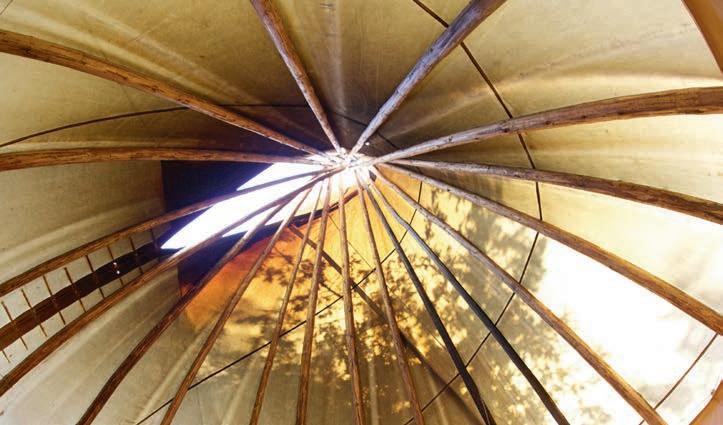
3 minute read
Chanie Wenjack School for Indigenous Studies
CHANIE WENJACK SCHOOL FOR INDIGENOUS STUDIES ENHANCES INDIGENOUS RECONCILIATION AT TRENT UNIVERSITY
Academic requirement for Indigenous course content and new lecture series featuring Indigenous leaders also among key recommendations approved by University Senate
Trent University announced a significant addition to its 48-year history instilling Indigenous reconciliation in the institution’s everyday work with the approval of 11 key recommendations, among them the naming of the Chanie Wenjack School for Indigenous Studies. Coinciding with National Aboriginal Day, the announcement of the newly-named School was among a substantial series of recommendations, furthering Trent’s leadership in Indigenous reconciliation and education. The recommendations include an innovative lecture-talk series that will bring prominent Indigenous leaders to the University to speak on Indigenous issues, and a new academic requirement for all undergraduate students to successfully complete at least 0.5 credits from an approved list of courses with Indigenous content. With this recommendation, Trent becomes only the third university in Canada to institute mandatory Indigenous course content. “The naming of the Chanie Wenjack School for Indigenous Studies and the implementation of the associated recommendations are a milestone in the evolution of Indigenous Studies at Trent. We aim to educate Indigenous and non-Indigenous students about Indigenous history, traditions, cultures, and ways of knowing,” said Dr. Leo Groarke, president and vice-chancellor of Trent University. “National Aboriginal Day is a good day to celebrate these initiatives, but we are striving to make Indigenous reconciliation part of our everyday work and consciousness.” The naming of the new School honours the life and history of Chanie Wenjack, a young Anishinaabe boy who died in his attempt to escape residential school in 1966. The Chanie Wenjack School of Indigenous Studies brings together Trent’s undergraduate, master’s and Ph.D. programs under one School and unites various events, initiatives and spaces dedicated to Indigenous perspectives, knowledge and culture. “This is the latest effort in Trent’s well-known 48-year record of Indigenous reconciliation,” said Professor David Newhouse, director of the School, and chair of Indigenous Studies at Trent. “We will continue to honour the life of Chanie Wenjack and recognize the impact that residential schools had on Indigenous peoples through the work that we plan to undertake at Trent. Our goal at the Chanie Wenjack School of Indigenous Studies is to constantly advance the knowledge of and about Indigenous peoples with a view to the overall improvement of quality of life and to contribute to the creation of places of respect, dignity and power for Indigenous peoples.” Additional initiatives listed among the recommendations approved by the University’s Senate include: › Launch of new Indigenous Research Centre—uniting researchers across the University who share an interest in Indigenous issues; › Redesign of Native Studies Reading Room into Centre for Indigenous Learning—housed in the newlyrenovated Bata Library in fall 2018, this new space will feature a display of significant documents, including the
Williams Treaty and other Indigenous documents that are significant to the history of the territory on which Trent is located; › Creation of Indigenous Knowledges & Pedagogies
Working Group—within the Centre for Teaching and
Learning, this group will assist faculty in the design, or review and redesign, of courses, and in the creation of new course offerings; › Establishment of a permanent sub-committee of
Undergraduate Studies Committee to recommend and periodically review courses on the Approved Indigenous
Course list; and › Review of Research Office portfolio and operations with aim of developing and/or adjusting current policies to raise awareness of, and respect for, Indigenous people.
Trent’s leadership in Indigenous Studies dates back to 1969 when the University became the first in Canada, and only the second in North America, to establish an academic department dedicated to the study of Indigenous peoples and Indigenous knowledges. Trent was the first university in Canada to create unique Indigenous spaces, design special entry programs to aid in the recruitment and admission of Indigenous students, hire dedicated support staff for Indigenous students, and to teach Indigenous languages and Indigenous Knowledge with elders and traditional peoples. A full timeline of the University’s history of leadership in Indigenous education can be viewed at the new website for the Chanie Wenjack School for Indigenous Studies at trentu.ca/indigenous.

